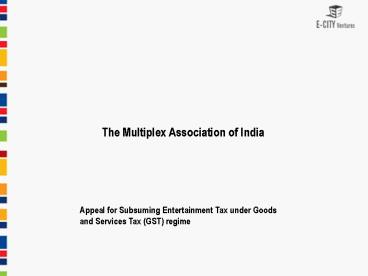The Multiplex Association of India - PowerPoint PPT Presentation
1 / 12
Title:
The Multiplex Association of India
Description:
The Multiplex Association of India. Appeal for Subsuming Entertainment Tax under ... Hindi Films need a common market with common engagement rules/laws across ... – PowerPoint PPT presentation
Number of Views:697
Avg rating:3.0/5.0
Title: The Multiplex Association of India
1
The Multiplex Association of India
Appeal for Subsuming Entertainment Tax under
Goods and Services Tax (GST) regime
2
Hindi Films need a common market with common
engagement rules/laws across the States
- Cinema is the primary (if not only) form of
entertainment for the masses of India. - We are not only the largest film producers in the
world (we make around 800-900 titles every year)
but also the largest film watchers in the world
(with annual admissions exceeding 3 billion). - However, the Hindi film industry has not been
able to establish a common marketplace for itself
because of the varied entertainment taxes levied
on exhibition, ranging from (15 to 50).
3
ENTERTAINMENT TAX STRUCTURE (HINDI CONTENT)
Regional films are not taxed in these States
4
Film Markets are fragmented and distorted
- Varied tax structures in the States.
- States that levy low entertainment taxes such as
Andhra Pradesh and Tamil Nadu have seen massive
investments in cinema infrastructure with a
screen density of almost 150 screens per million
of population. - However, other States that tax cinemas heavily,
have a screen density of less than 5 screens per
million of population, rendering the country
under screened.
5
Spread of Theatres in India
6
Films suffer the consequences of cascading taxes
- Cinema markets are fragmented.
- Cinemas are levied indirect taxes at multiple
levels without an option to offset one against
the other. - For instance, cinemas pay service tax on CAM
charges, however, they are not permitted to
offset the service tax paid against entertainment
tax collected on sale of tickets, because
entertainment tax is levied by the State and
service tax is levied by the Centre.
7
Films suffer the consequences of cascading
taxes..Continue.
- Domestic cinema industry also pays sales tax on
food and beverages, property tax on real estate,
service tax on advertising revenues, show tax on
the number of shows held etc. - Hence, there is a direct need to harmonize both
Centre and State level indirect taxes, as is the
case world over. - This would also resolve the problem of cascading
taxes that the industry faces.
8
Entertainment Tax Insignificant Contribution to
State Taxes
- Share of Entertainment Tax to other taxes
collected on the state is miniscule .
9
Entertainment Tax State Revenue not to have
significant impact with Conversion to GST.
- Since Entertainment tax collection Vs other state
taxes is very less , it does not have much impact
on overall state revenues. - However, change to GST will give a major boost to
ailing cinema industry which is currently as a
standalone bleeding due to multiple taxes imposed
within the state with high rates.
10
International model on entertainment taxes
advocates for a GST regime !!
- Over 120 countries have adopted a GST levy on
purchase of cinema tickets. - India, on its way to usher in a national Goods
and Service Tax by 2010 should subsume
entertainment tax within the scope of GST.
11
An opportune time to -
- To exercise constitutional powers and make
amendments in the State and Central Tax Act to
include entertainment tax in the list of goods
and services that require harmonization with the
State and the Center, under the GST regime. - Replace entertainment tax with GST for the cinema
industry.
12
(No Transcript)































